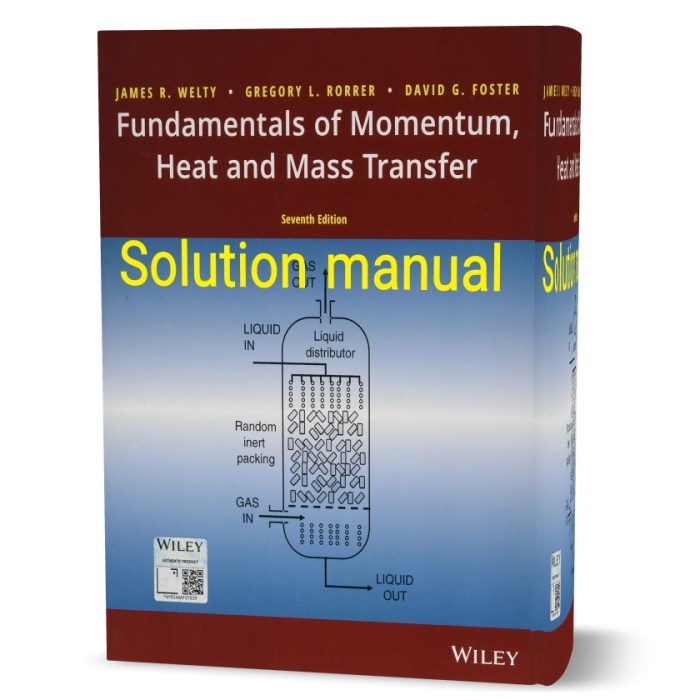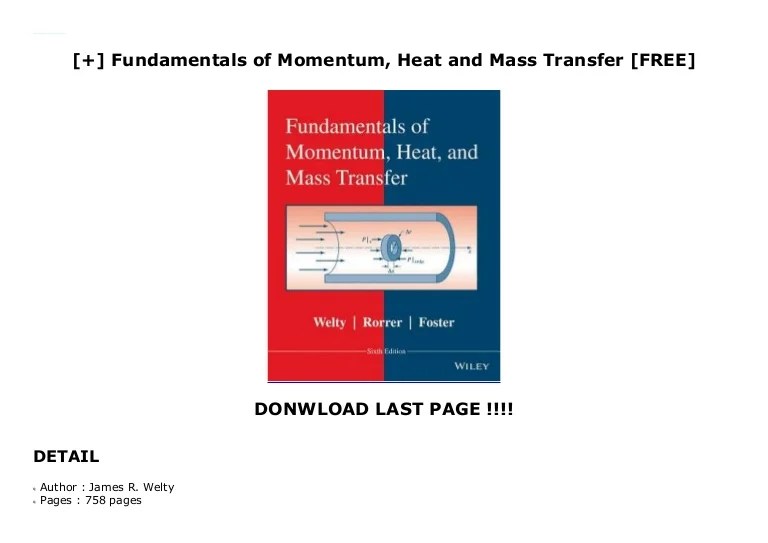Fundamentals of momentum heat and mass transfer answers – Fundamentals of momentum, heat, and mass transfer answers provides a comprehensive overview of the fundamental principles governing the transport of momentum, heat, and mass in various engineering systems. This in-depth guide explores the conservation laws, fluid properties, and governing equations that underpin these processes, offering a solid foundation for understanding and analyzing transport phenomena in real-world applications.
The study of momentum, heat, and mass transfer is crucial in diverse engineering fields, including mechanical, chemical, and biomedical engineering. By understanding these fundamental concepts, engineers can design and optimize systems for efficient heat transfer, fluid flow, and mass exchange, leading to advancements in energy conservation, thermal management, and chemical processing.
Introduction
Momentum, heat, and mass transfer are fundamental processes that occur in various natural and industrial systems. Understanding the principles governing these processes is crucial for engineers and scientists in diverse fields.
Basic Principles
Conservation Principles
The conservation of mass, momentum, and energy principles are fundamental to understanding momentum, heat, and mass transfer. These principles state that the total mass, momentum, and energy within a closed system remain constant over time.
Fluid Properties
Fluid properties, such as density, viscosity, and thermal conductivity, play a significant role in momentum, heat, and mass transfer. These properties influence the behavior of fluids in flow and affect the rate of heat and mass transfer.
Momentum Transfer: Fundamentals Of Momentum Heat And Mass Transfer Answers

Types of Fluid Flow
Fluid flow can be classified as laminar, turbulent, or transitional. Laminar flow is characterized by smooth, orderly motion, while turbulent flow is characterized by chaotic, irregular motion.
Boundary Layers
Boundary layers are thin regions near solid surfaces where the fluid velocity changes rapidly due to friction. The thickness and characteristics of boundary layers impact momentum transfer.
Pressure Drop
Pressure drop occurs when fluid flows through a system. Factors such as pipe diameter, fluid velocity, and surface roughness affect the magnitude of pressure drop.
Heat Transfer

Modes of Heat Transfer
Heat can be transferred through conduction, convection, and radiation. Conduction involves the transfer of heat through direct contact between substances, convection involves the transfer of heat through the movement of fluids, and radiation involves the transfer of heat through electromagnetic waves.
Thermal Conductivity
Thermal conductivity is a measure of a material’s ability to conduct heat. It influences the rate of heat transfer through the material.
Factors Affecting Heat Transfer Rate
Factors such as temperature difference, surface area, and fluid velocity affect the rate of heat transfer.
Mass Transfer

Types of Mass Transfer Processes
Mass transfer processes include diffusion, convection, and migration. Diffusion involves the movement of mass due to concentration gradients, convection involves the movement of mass due to fluid flow, and migration involves the movement of mass due to an applied electric or magnetic field.
Mass Diffusivity
Mass diffusivity is a measure of a material’s ability to allow the diffusion of mass. It influences the rate of mass transfer through the material.
Factors Affecting Mass Transfer Rate, Fundamentals of momentum heat and mass transfer answers
Factors such as concentration difference, surface area, and fluid velocity affect the rate of mass transfer.
Applications
The fundamentals of momentum, heat, and mass transfer are applied in various engineering fields, including the design of heat exchangers, fluid flow systems, and mass transfer equipment.
Essential FAQs
What are the key principles of momentum transfer?
The key principles of momentum transfer include the conservation of mass, momentum, and energy, as well as the role of fluid properties such as viscosity and density in governing fluid flow behavior.
How is heat transfer classified?
Heat transfer is classified into three modes: conduction, convection, and radiation. Each mode involves distinct mechanisms for the transfer of thermal energy.
What factors affect the rate of mass transfer?
The rate of mass transfer is influenced by factors such as the concentration gradient, mass diffusivity, temperature, and flow conditions.